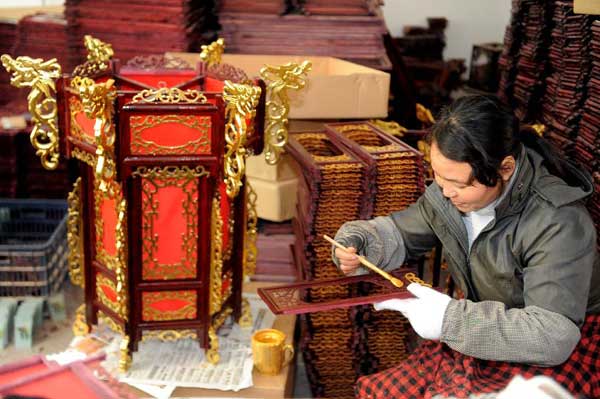Making it mine - copyright or copy wrong?
Updated: 2014-07-18 09:14
By Erik Nilsson (China Daily)
|
||||||||
 |
| Iowa expat finds China connection |
 |
| Excuse me, while I check my phone |
Tuntou village's palace-lantern industry shines a light on China's need to develop well-conceived and detailed management systems of intellectual property rights and their role in cultural heritage preservation.
The settlement's industry has no doubt created a brilliant local economy. The average annual salary is 15,000 yuan ($2,400) a year. Few locals migrate to cities. Instead, farmers from other villages migrate to Tuntou, the Party chief told me last year.
Zhang Fengjun, the only provincially designated intangible cultural heritage inheritor of palace lantern-making, says that's partly because he owns nine patents related to the craft born in the Eastern Han Dynasty (AD 25-220).
"I've been successful in introducing this heritage to the market and industrializing it," Zhang told me.
What I wasn't able to divine during the interview is exactly how innovative Zhang's patents are. Yet there doesn't seem to be evidence they've inhibited the preservation of intangible cultural heritage's legacy in Hebei province's Gaocheng county, which produces 90 percent of the world's palace lanterns.
But the very fact they exist begs sobering questions about ownership and cultural heritage.
One is: What kind of a precedent do such cases create?
While Gaocheng's heritage hasn't visibly suffered and has seemingly benefited - although we can only speculate about how history may have played out without the patents - it seems likely intellectual property rights may hinder other Chinese cultural heritage forms in other places.

 Star Stefanie Sun holds concert in Beijing
Star Stefanie Sun holds concert in Beijing
 Faye Wong's manager refutes star's drug rumors
Faye Wong's manager refutes star's drug rumors
 Lu Yi and daughter Bei Er pose for street snaps
Lu Yi and daughter Bei Er pose for street snaps
 Photoshoots of actress Li Xiaomeng
Photoshoots of actress Li Xiaomeng
 Council of Fashion Designers of America Awards
Council of Fashion Designers of America Awards
 Fan Bingbing, first Chinese actress in Barbie Hall of Fame
Fan Bingbing, first Chinese actress in Barbie Hall of Fame
 Awarding ceremony of 2014 hito Pop Music held in Taipei
Awarding ceremony of 2014 hito Pop Music held in Taipei
 Zhao Liying's photo shoot for Children's Day
Zhao Liying's photo shoot for Children's Day
Most Viewed
Editor's Picks

|

|

|

|

|

|
Today's Top News
Ex-security chief Zhou Yongkang under probe
Prudence urged over solar dispute
US visa delays likely to continue
McDonald's fishing for supplier
OSI group to fund food safety
China's FDI in US set for increase
Glitch delays visas for US-bound students
A musical spoof of the Clinton years
US Weekly

|

|








